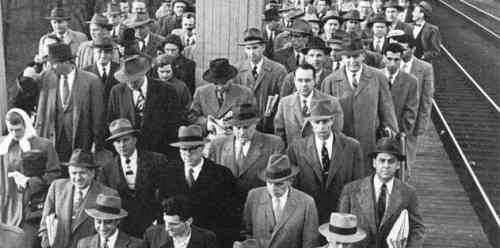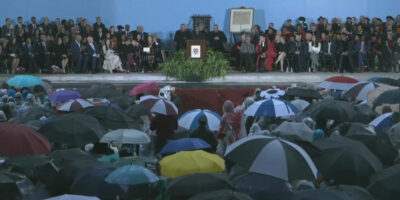When I was in college, one of my favorite authors was Kurt Vonnegut, Jr.
Equal parts futurist, satirist, and humanist, he is best known for novels like Cat’s Cradle, Slaughterhouse Five, and Breakfast of Champions, though he was also a prolific essayist and short story writer.
Just after World War II, he found himself working in public relations for General Electric in Schenectady, New York. It was the 1950’s—boom time for corporate America and the rise of the “man in the gray flannel suit” (think Don Draper in Mad Men).
Vonnegut’s experiences in that corporate culture led to his first published novel, Player Piano, about a future dystopian America where people have largely been replaced by machines, and lost their purpose in society; and short stories like one of my favorite Vonnegut gems, “Poor Little Rich Town,” which appeared in Collier’s magazine in October of 1952.
The story is about Newell Cady, an “efficiency expert” hired by big companies to help them reach new heights of profitability. “Cady could stroll through a plant that had been losing money for a generation,” Vonnegut writes, “glance at the books, yawn and tell the manager how he could save half a million a year in materials, reduce his staff by a third, triple his output and sell the stuff he’d been throwing out as waste for more than the cost of installing air conditioning and continuous music throughout the plant. And the air conditioning and music would increase individual productivity by as much as ten percent and cut union grievances by a fifth.”
Pretty impressive guy.
Well, the Federal Apparatus Corporation hires Cady to oversee the construction of their new headquarters in Illium, New York, not far from the village of Spruce Falls, which was suffering some hard times.
Spruce Falls is one of those Norman Rockwell sorts of places—a picturesque hamlet with a volunteer fire department, town square, and weekly church bake sales.
The town fathers (and yes, they are all fathers) are excited to learn that Cady will be renting a home in Spruce Falls, with the option to buy. This is the chance they have been waiting for to turn things around, and drive up property values by attracting company executives and their families into “tasting the joys of village life.”
Breaking with tradition, they waive the usual requirements of residency and service to the community and immediately elect Cady to full membership in the Fire Department and appoint him as head judge of the annual Hobby Show.
It’s not long, though, before Cady’s particular talents come into conflict with the town’s idyllic ways of life.
He bullishly rearranges the post office so the poor, flustered Mrs. Dickle can sort the mail more quickly and doesn’t “waste” so much of her time stepping around boxes and watering her collection of houseplants.
He berates the volunteer firemen for wanting to purchase a shiny, new truck with chrome bumpers and eighteen-foot ladders when the old jalopy is doing the job just fine.
And he offends and eliminates all but one of the participants in the annual Hobby Show, judging their creations pointless, and a “mess of garbage.”
It takes a while and a little convincing, but finally Mrs. Dickle, the firemen, and even the most resolute of those stodgy town fathers has had enough.
Houseplants once again festoon the post office, everyone is taking turns riding the shiny, new fire truck, and in a hastily called town meeting, Chief Atkins revokes Cady’s membership in the fire department (which, anyway, was in violation of the by-laws).
They hold out hope that he will come around to their way of thinking, but in the meantime caution that “A village isn’t like a factory, where you can walk in and see what’s being made at a glance, and then look at the books and see if it’s a good or bad operation. We’re not manufacturing or selling anything. We’re trying to live together. Every man’s got to be his own expert at that, and it takes years.”
Indeed.
I was reminded of Newell Cady and the residents of Spruce Falls recently by news of a few seemingly unrelated, but actually quite connected, events:
As the Boston Globe and other area news agencies have been reporting, the Commonwealth of Massachusetts seems to enjoying one of the fastest and most successful economic recoveries from the recent Great Recession of any state in the nation.
Unemployment has dropped to 3.6%, the lowest it has been since 2001, and well below what most economists consider “full employment.”
Real estate is rebounding: The median home price in the Bay State reached $372,000 in August, a new record.
And, boy, are we getting productive again: our GDP growth leads the northeast.
But…
For the tenth year in a row, we are weathering a structural state budget deficit in which spending, especially on budget busters like healthcare, is outpacing lackluster tax revenues.
That leaves very little for badly needed investments in public infrastructure and services like roads, railways, and, significantly, higher education.
As a result, despite our reputation as the world’s leader in higher education, support for Massachusetts’ public colleges and universities continues to lag behind the rest of the country, and we may be in danger of heading in the direction of the faded village of Spruce Falls.
According to the State Higher Education Officers (SHEEO) annual finance report, enrollment at Massachusetts public colleges and universities increased 15% between 2008 (pre-recession) and 2015 (recovery); while financial support for students declined by 16%.
Most public colleges in the Bay State are already spending less per student today than they were a decade ago.
On top of that, while the national average for state-supported, need-based financial aid to students is just over $2,400 a year, the typical Massachusetts undergraduate receives only about $650, leaving us 49th out of 50 states in supporting our neediest students.
Something’s gotta give, right?
That’s the message that Massachusetts Secretary of Education James Peyser delivered recently in an address to the faculty and staff of the University of Massachusetts Boston.
Facing a vocal crowd of educators, many carrying signs protesting the state’s disinvestment in higher education and actually booing him as if he were Newell Cady himself, Secretary Peyser, was blunt with his assessment: “Educational leaders need to become increasingly hardheaded in separating the wheat from the chaff,” he said, cautioning that colleges like UMass “can’t afford to keep marginal programs on life support in hopes that they’ll eventually get better or bigger.”
Instead, he encouraged institutions to focus on their strengths, suggesting that, “Trying to be all things to all people is a formula for mediocrity.”
That may be a bitter pill to swallow for many public college and university faculty, staff, and students, who feel that the state is simply shirking its obligations to higher education and laying the blame for any shortcomings on already strapped campuses.
But bitter or not, it is a message that everyone in higher ed better be paying attention to—and doing something about—because it is unlikely the state will be able to turn things significantly around any time soon.
Efficiency Expert Newell Cady and Secretary of Education James Peyser may sound strident or even overbearing to some, and banishing houseplants from a sleepy post office backroom may be a step or two over the line, but their basic message is not wrong: companies, villages, and even colleges do have to live within their means.
But how best can we can find ways to do that humanely, with strategies that fit our values and may eventually even lead to greater success? After all, colleges, like villages, also aren’t factories, where you can walk in and see what’s being made at a glance.
While many industries, from farming to manufacturing to transportation and retail, have become more efficient with new technologies and automation, college teaching and learning remains largely a human resource-intensive endeavor.
Much like Spruce Falls, there are elements of teaching and learning—like the one-on-one personal relationship that develops between a highly effective teacher and a motivated student—that just can’t be mechanized or easily “scaled up.”
Predictions that online degrees and MOOCs (Massive Open Online Courses) that enroll thousands or even hundreds of thousands of students would forever transform the higher education landscape, reducing labor costs and expanding access, have largely not come true, as we find that most students (like most people in general) still prefer “high touch” over “high tech” when it comes to learning, especially complex information and skills.
So NECC, like most public colleges in the Bay State, has been tightening our belts whenever possible, seeking reasonable efficiencies that don’t compromise our core mission, and squeezing dollars where we can, while seeking promise in “hybrid” and experimental approaches to teaching and learning that may only modestly reduce the budget, but provide students the best of both worlds.
For example, this fall NECC became the first community college in the state to offer a special “competency-based” certificate in computer applications.
In Competency Based Education (CBE) programs, students are able to start and complete courses online, on their own schedule, with the help of “learning coaches” who offer guidance and support, rather than the more traditional model of lecturing and final exams.
Scaled up, with more certificate and degree options, CBE offerings may lead to higher enrollments and even more students completing career credentials they need.
And NECC is exploring a partnership with ALEX (an acronym for “Anyone’s Learning Experience”), an online marketplace for higher education courses from colleges around the country and around the world that allows students to select what and how they learn “a la carte” and build their own credentials.
Think Airbnb for online learning, and a creative way to tap into new student markets with otherwise unused seats in classes.
Experiments like these, we think, make efficient use of the resources we have, while preserving the mind, the heart, and the soul of our campus village.
And, who knows, maybe even Newell Cady would approve…






